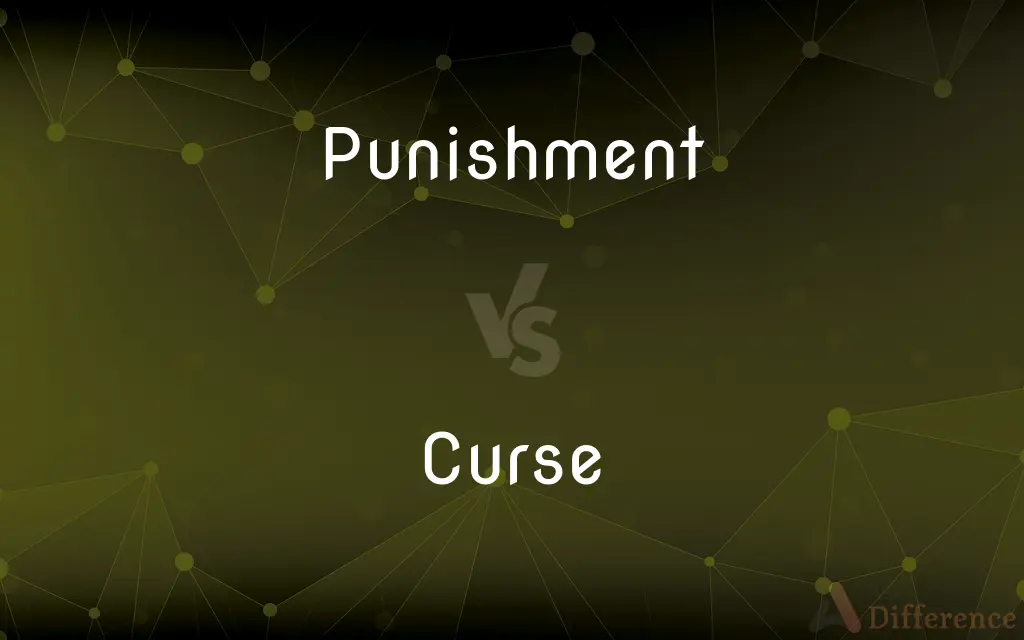Punishment vs. Curse — What's the Difference?
By Maham Liaqat & Urooj Arif — Updated on March 22, 2024
Punishment is a consequence for a specific action or behavior, often intended as correction, while a curse is a wish for misfortune to befall someone, often involving supernatural elements.

Difference Between Punishment and Curse
Table of Contents
ADVERTISEMENT
Key Differences
Punishment is a deliberate action taken to correct or deter undesirable behavior, typically grounded in legal or ethical frameworks. It involves a clear cause-and-effect relationship, where the punishment is a direct consequence of an action. In contrast, a curse is often associated with the supernatural or mystical, intended to bring about misfortune or harm without a direct causal relationship to the recipient's actions.
While punishments are administered by authorities or individuals in a position of power, such as parents, teachers, or judicial systems, to enforce rules or laws, curses are usually invoked or cast by individuals or entities believed to possess supernatural powers. These can range from simple ill-wishes to complex rituals intended to affect the target's life negatively.
The objective of punishment is typically correctional or deterrent, aiming to reform the behavior of the individual or discourage others from similar actions. Curses, however, are primarily driven by malice or a desire for revenge, without any intention of reforming or correcting behavior.
Punishments are often standardized or follow a set of guidelines, providing a measure of predictability and fairness in their application. Curses, on the other hand, are highly variable and personal, dependent on the beliefs, intentions, and methods of the person casting them, with effects that are often believed to be beyond human control.
The impact of punishment is generally tangible and measurable, such as fines, imprisonment, or community service, and is intended to be proportional to the offense. The effects of a curse, however, are believed to be unpredictable and can range from minor inconveniences to severe misfortunes, often perceived as disproportionate or unrelated to any specific action by the recipient.
ADVERTISEMENT
Comparison Chart
Nature
Consequence for actions, intended as correction.
Wish for misfortune, often involving supernatural elements.
Source
Administered by authorities or figures of power.
Cast by individuals or entities believed to have supernatural powers.
Objective
Correctional or deterrent, aimed at reforming behavior.
Driven by malice or revenge, without intent of reform.
Standardization
Often follows guidelines or standards.
Highly variable and personal.
Impact
Tangible and proportional to the offense.
Unpredictable, ranging from minor to severe misfortunes.
Compare with Definitions
Punishment
Consequence imposed for breaking a rule or law.
The judge's sentence served as a punishment for the crime.
Curse
A wish for misfortune or harm to befall someone.
The witch's curse was feared by all in the village.
Punishment
Administered by someone in a position of power.
The teacher's detention was a punishment for tardiness.
Curse
Often stems from a desire for revenge.
Out of spite, he muttered a curse under his breath.
Punishment
Intended to deter future misconduct.
Community service was assigned as punishment to instill a sense of responsibility.
Curse
Effects are not tied to specific actions or offenses.
The ancient curse affected the family for generations, regardless of their deeds.
Punishment
Results in specific, measurable consequences.
The punishment for cheating was a failing grade on the exam.
Curse
Involves rituals or spells.
The curse was cast with an intricate ritual under the full moon.
Punishment
Severity corresponds to the severity of the offense.
Fines increase as punishment for repeated parking violations.
Curse
Consequences can vary widely.
After the curse, a series of unexplained misfortunes befell her.
Punishment
Punishment, commonly, is the imposition of an undesirable or unpleasant outcome upon a group or individual, meted out by an authority—in contexts ranging from child discipline to criminal law—as a response and deterrent to a particular action or behavior that is deemed undesirable or unacceptable. It is, however, possible to distinguish between various different understandings of what punishment is.The reasoning for punishment may be to condition a child to avoid self-endangerment, to impose social conformity (in particular, in the contexts of compulsory education or military discipline), to defend norms, to protect against future harms (in particular, those from violent crime), and to maintain the law—and respect for rule of law—under which the social group is governed.
Curse
A curse (also called an imprecation, malediction, hex, execration, malison, anathema, or commination) is any expressed wish that some form of adversity or misfortune will befall or attach to one or more persons, a place, or an object. In particular, "curse" may refer to such a wish or pronouncement made effective by a supernatural or spiritual power, such as a god or gods, a spirit, or a natural force, or else as a kind of spell by magic or witchcraft; in the latter sense, a curse can also be called a hex or a jinx.
Punishment
The imposition of a penalty or deprivation for wrongdoing
The swift punishment of all offenders.
Curse
An appeal or prayer for evil or misfortune to befall someone or something.
Punishment
A penalty imposed for wrongdoing
"The severity of the punishment must ... be in keeping with the kind of obligation which has been violated" (Simone Weil).
Curse
Evil or misfortune viewed as resulting from such an appeal
Believed that the amulet would ward off curses.
Punishment
Rough treatment or use
These old skis have taken a lot of punishment over the years.
Curse
A source or cause of evil; a scourge
“Selfishness is the greatest curse of the human race” (William Ewart Gladstone).
Punishment
The act or process of punishing, imposing and/or applying a sanction.
The naughty children were given a punishment by their teachers.
Curse
A profane word or phrase; a swearword.
Punishment
A penalty to punish wrongdoing, especially for crime.
A light punishment
A harsh punishement
Curse
(Ecclesiastical) A censure, ban, or anathema.
Punishment
A suffering by pain or loss imposed as retribution
Curse
(Offensive) Menstruation. Used with the.
Punishment
(figuratively) Any harsh treatment or experience; rough handling.
A vehicle that can take a lot of punishment
Curse
To invoke evil or misfortune upon; damn.
Punishment
The act of punishing.
Curse
To swear at
Cursed the car because it wouldn't start.
Punishment
Any pain, suffering, or loss inflicted on a person because of a crime or offense.
I never gave them condign punishment.
The rewards and punishments of another life.
Curse
To bring evil upon; afflict
Was cursed with crippling arthritis.
Punishment
A penalty inflicted by a court of justice on a convicted offender as a just retribution, and incidentally for the purposes of reformation and prevention.
Curse
(Ecclesiastical) To put under a ban or anathema; excommunicate.
Punishment
Severe, rough, or disastrous treatment.
Curse
To utter curses; swear.
Punishment
The act of punishing
Curse
A supernatural detriment or hindrance; a bane.
Curse
A prayer or imprecation that harm may befall someone.
Curse
The cause of great harm, evil, or misfortune; that which brings evil or severe affliction; torment.
Curse
A vulgar epithet.
Curse
A woman's menses.
Curse
(transitive) To place a curse upon (a person or object).
Curse
To call upon divine or supernatural power to send injury upon; to imprecate evil upon; to execrate.
Curse
(transitive) To speak or shout a vulgar curse or epithet.
Curse
(intransitive) To use offensive or morally inappropriate language.
Curse
To bring great evil upon; to be the cause of serious harm or unhappiness to; to furnish with that which will be a cause of deep trouble; to afflict or injure grievously; to harass or torment.
Curse
To call upon divine or supernatural power to send injury upon; to imprecate evil upon; to execrate.
Thou shalt not . . . curse the ruler of thy people.
Ere sunset I'll make thee curse the deed.
Curse
To bring great evil upon; to be the cause of serious harm or unhappiness to; to furnish with that which will be a cause of deep trouble; to afflict or injure grievously; to harass or torment.
On impious realms and barbarous kings imposeThy plagues, and curse 'em with such sons as those.
Curse
To utter imprecations or curses; to affirm or deny with imprecations; to swear.
Then began he to curse and to swear.
His spirits hear me,And yet I need must curse.
Curse
An invocation of, or prayer for, harm or injury; malediction.
Lady, you know no rules of charity,Which renders good for bad, blessings for curses.
Curse
Evil pronounced or invoked upon another, solemnly, or in passion; subjection to, or sentence of, divine condemnation.
The priest shall write these curses in a book.
Curses, like chickens, come home to roost.
Curse
The cause of great harm, evil, or misfortune; that which brings evil or severe affliction; torment.
The common curse of mankind, folly and ignorance.
All that I eat, or drink, or shall beget,Is propagated curse.
Curse
Profane or obscene expression usually of surprise or anger;
Expletives were deleted
Curse
An appeal to some supernatural power to inflict evil on someone or some group
Curse
An evil spell;
A witch put a curse on his whole family
He put the whammy on me
Curse
A severe affliction
Curse
Utter obscenities or profanities;
The drunken men were cursing loudly in the street
Curse
Heap obscenities upon;
The taxi driver who felt he didn't get a high enough tip cursed the passenger
Curse
Wish harm upon; invoke evil upon;
The bad witch cursed the child
Curse
Exclude from a church or a religious community;
The gay priest was excommunicated when he married his partner
Common Curiosities
What is the main purpose of punishment?
The main purpose of punishment is to correct or deter unacceptable behavior, ensuring adherence to societal rules and norms.
What forms can punishment take?
Punishment can be physical, financial, social, or psychological, and is often imposed by an authority or institution.
Can punishment be considered a curse?
While punishment can be severe and undesirable, it is not a curse as it lacks the supernatural element and is based on legal or ethical grounds.
Is a curse always effective?
The effectiveness of a curse is subjective and depends on the belief of the individuals involved; it lacks a tangible measure.
Are curses recognized in legal systems?
No, curses are not recognized or enforced by legal systems as they are based on superstition and lack tangible evidence.
Can a curse be reversed?
Beliefs in curses often include the possibility of reversal or removal, usually through specific rituals or countermeasures, but this is also rooted in superstition.
Do all cultures believe in curses?
Belief in curses varies widely among cultures, with some taking them very seriously while others may view them as mere superstition.
How does a curse work?
A curse is believed to work through supernatural or mystical forces, bringing misfortune to its target based on the strength of the belief in its power.
What is the role of authority in punishment?
Authorities, such as legal institutions, educational systems, or governing bodies, play a key role in defining, imposing, and enforcing punishment.
How does society view punishment and curses?
Society generally views punishment as a necessary component of law and order, while curses are often seen through the lens of cultural superstition and personal belief.
Share Your Discovery

Previous Comparison
Peg vs. Clothespin
Next Comparison
Bagel vs. DoughnutAuthor Spotlight
Written by
Maham LiaqatCo-written by
Urooj ArifUrooj is a skilled content writer at Ask Difference, known for her exceptional ability to simplify complex topics into engaging and informative content. With a passion for research and a flair for clear, concise writing, she consistently delivers articles that resonate with our diverse audience.













































